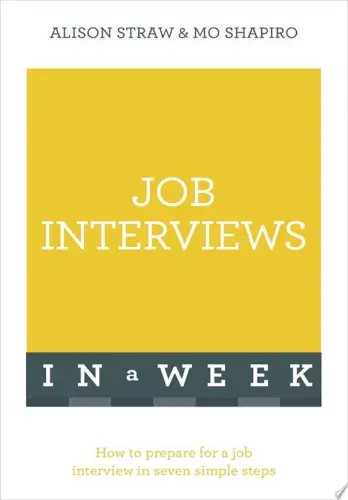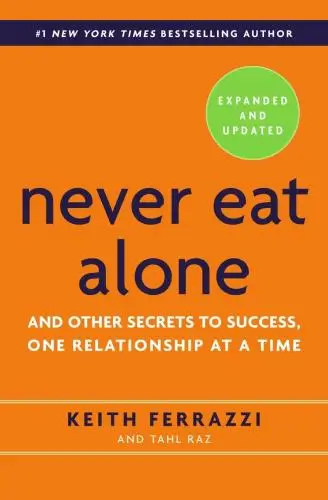Never Eat Alone
And Other Secrets to Success, One Relationship at a Time
What's it about?
Never Eat Alone is for anyone looking to master the art of networking and building meaningful connections. Ferrazzi emphasizes the power of relationships in both personal and professional success, offering practical strategies for cultivating a strong network. He stresses the importance of authenticity and generosity in networking, rather than simply seeking out contacts for personal gain. Through personal anecdotes and actionable advice, Ferrazzi teaches readers how to leverage their connections for mutual benefit, ultimately leading to greater opportunities and success.
About the Author
Keith Ferrazzi is an American author and entrepreneur, best known for his books "Never Eat Alone" and "Who's Got Your Back." His work focuses on networking, relationship building, and the power of connections. Ferrazzi emphasizes the importance of generosity and authenticity in professional relationships, offering practical advice for achieving personal and career success.
10 Key Ideas of Never Eat Alone
Build Your Network Before You Need It
Start cultivating your relationships and network long before you find yourself in a situation where you need support, advice, or opportunities.
The reasoning behind this tactic is that genuine relationships take time to develop.
By investing in your network early, you're more likely to have a robust support system when necessary.
This preemptive approach ensures that you're not reaching out to people only when you need something, which can come off as insincere or opportunistic.
Learn DeeperInitiate Conversations: Don't wait for others to reach out. Be proactive in starting conversations, whether it's through social media, at a networking event, or during a casual meet-up. Show genuine interest in what others do and share about yourself as well.
Offer Help Before Asking for It: Look for opportunities to assist others in your network without expecting anything in return. This could be as simple as sharing a helpful article, providing feedback on a project, or making an introduction.
Stay in Touch: Regularly check in with your contacts, not just when you need something. A simple message asking how they are or commenting on a recent achievement can keep the relationship warm and genuine.
Attend Networking Events: Make it a point to attend industry meetups, conferences, and other events where you can meet new people and strengthen existing relationships. Always follow up afterward with a message to express your pleasure in meeting them.
Be Authentic: In all your interactions, be yourself. Authenticity builds trust and makes people more inclined to support you when you need it.
- Example
Imagine you're at a conference and you meet someone working in an area you're interested in. Instead of immediately asking for job leads, you ask insightful questions about their work, share your own experiences, and offer to connect them with a colleague who has similar interests. Later, you follow up with an email thanking them for the conversation and attaching an article related to a topic you discussed.
- Example
You notice a former colleague is launching a new project on LinkedIn. Even though you haven't spoken in a while, you send a congratulatory message and offer to share the project within your network. This rekindles the relationship and sets a positive tone for future interactions.
Make Your Interactions About Them, Not You
When engaging with others, focus the conversation on their interests, challenges, and achievements rather than your own.
People are more receptive and willing to connect when they feel heard and valued.
This tactic is grounded in the principle of reciprocity; by showing genuine interest in others, you're more likely to foster goodwill and encourage them to reciprocate your interest.
This approach helps build deeper, more meaningful connections.
Learn DeeperListen More Than You Speak: In conversations, make a conscious effort to listen actively. Show that you're engaged by nodding, maintaining eye contact, and asking follow-up questions based on what the other person is saying.
Ask Open-Ended Questions: Encourage others to share more about themselves by asking questions that can't be answered with a simple 'yes' or 'no'. For example, instead of asking 'Did you like your trip?', ask 'What did you love most about your trip?'
Share Relevant Information or Connections: If during the conversation, you find an opportunity to offer help, such as suggesting a book, introducing them to someone in your network, or sharing a helpful tip, do so without expecting anything in return. This demonstrates your willingness to add value to their lives.
Express Genuine Interest and Appreciation: Compliment their achievements and express genuine interest in their projects or challenges. Let them know you admire their work or are interested in learning more about their experiences.
- Example
During a networking event, instead of leading with your own achievements or goals, you start the conversation by asking the person about their current projects. You listen attentively, then mention a book you've read recently that's relevant to their work, offering to send them the details.
- Example
At a dinner party, you find yourself seated next to someone who's recently returned from a trip to a place you've never visited. Instead of shifting the conversation to your own travel experiences, you ask them to share their favorite moments and what they learned from the trip. You show genuine interest by asking detailed questions about the culture and sights they describe.
Be Generous: Offer Your Help Without Expecting Anything in Return
Adopt a mindset of generosity by offering your help, resources, or knowledge without immediately expecting something in return.
This tactic builds trust and goodwill, making others more inclined to think of you and offer their assistance when opportunities arise.
The idea is that generosity fosters a positive reputation and encourages a culture of mutual support within your network.
Learn DeeperStart Small: Begin by offering small gestures of help that are within your capacity. This could be as simple as sharing an article relevant to someone's interests or offering a listening ear.
Be Genuine: When you offer help, do so because you genuinely want to, not because you expect a favor in return. People can sense sincerity and are more likely to respond positively.
Identify Opportunities: Keep an eye out for opportunities where you can lend a hand. Whether it's a colleague struggling with a project or a friend moving to a new house, your initiative will be appreciated.
Share Your Knowledge: If you have expertise in a certain area, offer to mentor someone who is eager to learn. This could be through informal advice or more structured guidance.
Follow Up: After helping someone, check in with them to see how things are going. This shows that your offer of help was sincere and not just a one-off gesture.
- Example
Imagine a colleague is overwhelmed with a new software tool that you're proficient in. Offering to spend an hour walking them through the basics can make a significant difference in their work efficiency.
- Example
A friend mentions they're looking to change careers but don't know where to start. Since you've recently gone through a similar transition, you could offer to review their resume and share tips on networking in their desired industry.
Follow Up and Follow Through
After meeting someone new or promising to do something, always follow up promptly and fulfill any commitments you've made.
This tactic is crucial for building reliability and trustworthiness.
Consistent follow-up demonstrates your professionalism and commitment to maintaining the relationship, which are key components in establishing a strong, dependable network.
Learn DeeperSet a Reminder: Right after meeting someone new or making a promise, set a reminder on your phone or calendar. This could be to send an email, make a call, or deliver on what you've promised. Timing is key, so aim to follow up within 24 to 48 hours.
Personalize Your Follow-Up: When reaching out, mention something specific from your interaction to show you were genuinely engaged. This could be a shared interest, a detail about their work, or a mutual connection. It makes the follow-up more meaningful and memorable.
Keep a Record: Maintain a simple spreadsheet or use a CRM (Customer Relationship Management) tool to track your commitments and interactions. Note down what you've promised and to whom, along with the follow-up date. This helps ensure nothing slips through the cracks.
Offer Value in Your Follow-Up: Whenever possible, include something of value in your follow-up. This could be an article, a contact, or an invitation to an event that aligns with their interests or needs. It shows you're thoughtful and invested in the relationship.
- Example
After meeting a potential mentor at a conference, you send them an email expressing your gratitude for the conversation. In the email, you reference a specific topic you discussed and attach an article related to that topic, showing you were attentive and are eager to continue learning from them.
- Example
You promise a new acquaintance to introduce them to a colleague who has experience in a field they're interested in. Within two days, you send an email connecting the two, briefly mentioning how you met the new acquaintance and why you think the introduction is beneficial for both parties.
Leverage Social Media to Stay Connected
Use social media platforms strategically to maintain connections and stay informed about what's happening in your network's lives.
This tactic allows for regular, low-effort touchpoints that keep relationships warm and enable you to offer timely assistance or congratulations, thereby reinforcing your presence and value within your network.
Learn DeeperCreate a Routine for Social Media Engagement: Dedicate a specific time each day or week to scroll through your social media feeds. Use this time not just for passive browsing but to actively comment on, like, and share your connections' achievements, updates, or posts. This keeps you visible and engaged in your network.
Personalize Your Interactions: When you see something significant happening in someone's life (a job change, a personal milestone, etc.), go beyond a simple like or generic comment. Send a personalized message or even a text if you have their number, acknowledging their news and expressing genuine interest or congratulations.
Utilize LinkedIn for Professional Networking: Regularly update your own LinkedIn profile with your latest achievements and career developments. Endorse the skills of your connections and write recommendations for those you've worked closely with. This not only strengthens your relationships but also encourages reciprocation.
Share Valuable Content: Become a resource within your network by sharing articles, videos, or other content that is relevant and beneficial to your connections. Tag individuals who you think would find the content particularly useful or interesting, thereby adding value to your interactions.
- Example
If a connection shares they've started a new job, instead of just liking the post, send them a message saying, 'Congratulations on the new role at [Company]! It sounds like a fantastic opportunity. Let's catch up soon; I'd love to hear more about it.'
- Example
When you come across an article discussing the latest trends in an industry a friend or connection is passionate about, share it on your social media tagging them, with a note saying, 'Saw this and immediately thought of you, [Friend's Name]! Would love to hear your thoughts on it.'
Deeper knowledge. Personal growth. Unlocked.
Unlock this book's key ideas and 15M+ more. Learn with quick, impactful summaries.
Read Full SummarySign up and read for free!
Never Eat Alone Summary: Common Questions
Experience Personalized Book Summaries, Today!
Discover a new way to gain knowledge, and save time.
Sign up for our 7-day trial now.
No Credit Card Needed

Similar Books

The Decision Book
Mikael Krogerus
This is Going to Hurt
Adam Kay
The ^AOxford Handbook of Job Loss and Job Search
Ute-Christine Klehe PhD
Job Interviews For Dummies®
Joyce Lain Kennedy
Job Interviews In A Week
Alison Straw
Handbook of Career Development
Gideon Arulmani
The Company She Keeps
Georgia Durante
The Millionaire Fastlane
MJ DeMarco
Losing My Virginity
Richard Branson
Crush It!
Gary VaynerchukTrending Summaries

Peak
Anders Ericsson
Never Split the Difference
Chris Voss
Smart Brevity
Jim VandeHei
The Psychology of Money
Morgan Housel
The First 90 Days
Michael D. Watkins
Atomic Habits
James Clear
Thinking, Fast and Slow
Daniel Kahneman
The Body Keeps the Score
Bessel van der Kolk M.D.
The Power of Regret
Daniel H. Pink
The Compound Effect
Darren HardyNew Books

Forex Trading QuickStart Guide
Troy Noonan
Comprehensive Casebook of Cognitive Therapy
Frank M. Dattilio
The White Night of St. Petersburg
Michel (Prince of Greece)
Demystifying Climate Models
Andrew Gettelman
The Hobbit
J.R.R. Tolkien
The Decision Book
Mikael Krogerus
The Decision Book: 50 Models for Strategic Thinking
Mikael Krogerus
Fichte
Johann Gottlieb Fichte
Do No Harm
Henry Marsh

